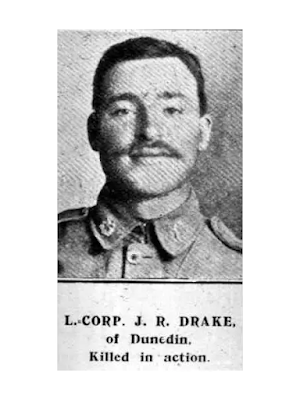Lance-Corporal John Robert Drake (killed) was born at Ravensbourne, Dunedin, thirty years ago. He went with the Main Body to Egypt, took part in the fighting at Suez in the early stages of the war, and then went to Gallipoli, taking part in the initial landing, and all the heavy fighting which followed. He subsequently went to France with the New Zealand troops, taking part in the battle of the Somme and other engagements, and fell at the taking of Messines. A brother, Private Benjamin Drake, enlisted with the 6th Reinforcements, and was wounded at Gallipoli. He was then sent to England, and after being in hospital there for some time was sent to France. A third brother, Private James Gibson Drake, enlisted with the 29th. Reinforcements, and is at present in Dunedin on sick leave. -Press, 27/6/1917.
Tuesday, 11 July 2023
8/562 L/corporal John Robert Drake, 14/9/1886-7/6/1917. "we shall change geography"
In June of 1917 an attack on German positions which had had a long and complex preparation was begun. It was opened with the firing of 19 mines, tunneled under German positions, containing 450 tons of high explosive. The night before the attack General Sir Charles Harington remarked to the press: "Gentlemen, I don't know whether we're going to make history tomorrow, but at any rate we shall change geography."
The mines were intended to blow a large gap in the German line, to be advanced through by British forces, aided by a moving artillery barrage and tanks. It was mostly successful and put British forces in a good position for their next offensive, the 3rd Battle of Ypres, also known as the Battle of Passchendaele.
John Drake was a fisherman when he enlisted in the Otago Infantry Regiment. He served at Gallipoli, being hospitalised with dysentery - as were so many others. After reaching France he was promoted and was killed in action on the first day of the Battle of Messines.
Andersons Bay Cemetery, Dunedin.
Subscribe to:
Post Comments (Atom)


No comments:
Post a Comment